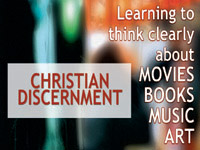Discernment 101a: Always Begin Objectively

The process of Christian cultural discernment involves asking a series of questions that allow us to deepen our understanding of whatever it is we are seeking to engage. Whether it is a novel or film, popular song or news article, lecture, essay or statement by a friend, political ideology, or whatever, the questions form a framework for reflection, learning, and conversation. The questions are simple enough to teach to children and probing enough to guide a scholar’s inquiry. They can be easily adapted and expanded to fit the subject at hand, and can summarized to look like this:
What’s being communicated?
What’s made to be attractive? How?
Where do I agree? What might I challenge? Why?
How can I speak and live the truth in a creative and understandable way in my pluralistic world?
One thing that is essential to understand is that the first two questions call for careful objectivity. They do not ask for our opinion, or for our judgment, or for our feelings. What we believe enters the discernment process, but later, in the third question. For the first two questions—What’s being said? What’s attractive?—we need to carefully observe, listen, see and understand as clearly and objectively as possible.
Here’s a good way to put this into perspective. As you seek to answer the first two questions, imagine the author of the book or magazine article you are reading, or the director of the movie you are watching, etc., is present. Your goal with these first two questions is to provide answers that will satisfy them. Your goal is to summarize and talk about the book’s or movie’s message or themes, and how the book or movie makes these messages or themes attractive with such objectivity that the author or director will respond, “You listened to me well. You took me seriously. Thank you.”
So, for example, when I am leading a film discussion I tell people we are going to begin by examining the film as carefully and objectively as we can. I tell them not to raise their opinion or express how they feel—there will be time for that later. We’re going to begin objectively and then—and only then—we’ll be ready to respond to the film.
There are multiple reasons for beginning the process of cultural discernment this way, as objectively as possible. The artist is a person made in God’s image, and so must be treated with dignity and care. This is true regardless of what they believe, how they live, or the god they worship. Second, if we do not first carefully listen, how can we possibly know how to respond or what we are actually responding to? C. S. Lewis argued that we should receive an artwork before we can properly judge it. Third, beginning with our opinion or some point of disagreement—as too often happens—merely makes us seem disagreeable and arrogant.
Some Christians are so eager to insert some Christian message into the conversation that they feel obligated to talk about the “gospel.” (I use quotation marks because usually only the atonement is mentioned, which is only one aspect of the good news about Christ.) When St Paul entered Athens and saw “the city was full of idols,” he did not begin telling people about how Jesus died for them. Instead, he “went through the city and looked carefully” so he could understand Athenian beliefs and practices (Acts 17:16, 23). And when he did speak he had something creative to say that presented Christ as Lord in a way the Athenians could understand. Some of them even believed (17:34).
Beginning as objectively as possible not only provides a good basis for continuing the process of discernment, it demonstrates something essential about what we believe.
This brief piece expands on “Discernment 101: An explanation of discernment,” found here

